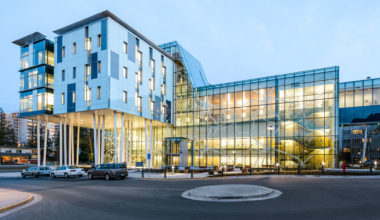As 12,000 neurologists descend on Vancouver for the American Academy of Neurology’s 68th annual meeting this week, the Djavad Mowafaghian Centre for Brain Health is poised to make the most of the opportunity to showcase our clinical and scientific leadership in the field.
Three Centre members will be giving talks at plenary sessions the world’s largest gathering of neurologists, taking place at the Vancouver Convention Centre April 15-21:
- Anthony Trauboulsee, the MS Society of Canada Research Chair, will discuss the results of a clinical trial of a new drug for multiple sclerosis
- Blair Leavitt, Professor in the Department of Medical Genetics, will describe the development of a potential new drug for Huntington’s disease and the current clinical trial
- Jon Stoessl, Co-Director of the Djavad Mowafaghian Centre for Brain Health, will review the latest developments in neuroimaging
Members of the Division of Neurology will be volunteering at a public-oriented Brain Health Fair: a free, one-day event connecting hundreds of neurology patients, caregivers, families, students, and those interested in brain health. The program will include a walk-through inflatable, interactive brain, opportunities to hold a human brain and to view animal brains, workshops to create brain-inspired arts and crafts, cranial nerve stations to demonstrate sensory nerves, an “Ask a Neurologist” booth, and more.
UBC’s National Core for Neuroethics will host a booth that showcases recent research by Judy Illes and Julie Robillard on topics including concussion, dementia, cognitive enhancement and autism, promoting opportunities to collaborate on research, and providing advice about finding reputable information online about brain health.
At 1:30 p.m. on April 15, join Naznin Virji-Babul, Will Panenka, Thalia Otamendi and Science World on the Discovery Stage for a panel discussion exploring the latest research and developments surrounding brain injury and concussions.
Dr. Traboulsee’s plenary session on the MS drug ocrelizumab stems from his role leading the largest arm of an international, randomized, double-blind trial of the monoclonal antibody, developed by Roche. The Vancouver site enroled 59 patients with relapsing-remitting MS, compared to an average enrolment of four or five patients at most other sites.
Dr. Traboulsee will be sharing results showing that ocrelizumab significantly reduced disability progression and brain tissue damage in both relapsing and primary progressive forms of MS. Ocrelizumab will soon be under review by the U.S. Food and Drug Administration and Health Canada for approval as an MS treatment.
Taking advantage of the event being hosted on UBC’s home turf, Dr. Traboulsee will bring a contingent of Roche and Genentech executives – including Roche Canada’s President and CEO Ronnie Miller along with three vice presidents (medical affairs, product strategy and finance and business services) – to the Djavad Mowafaghian Centre for Brain Health, where they will discuss UBC’s ongoing imaging research in MS, listen to a presentation on health economics from Larry Lynd in the Faculty of Pharmaceutical Sciences, discuss ocrelizumab’s potential to change patient care, and take a tour of the MS Clinic at the adjoining UBC Hospital.


